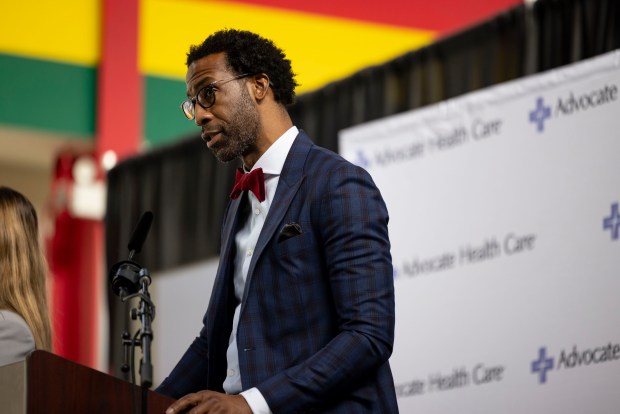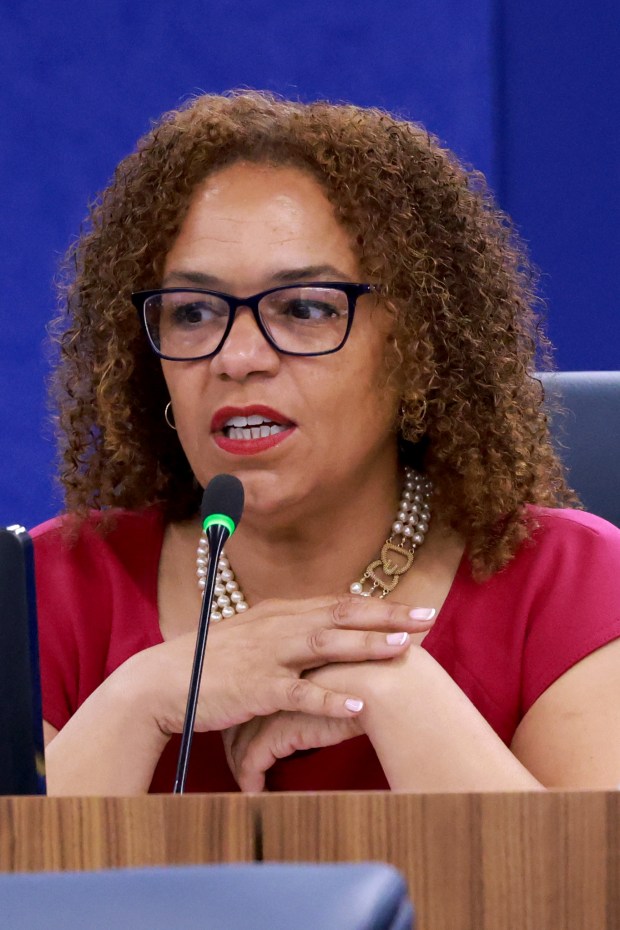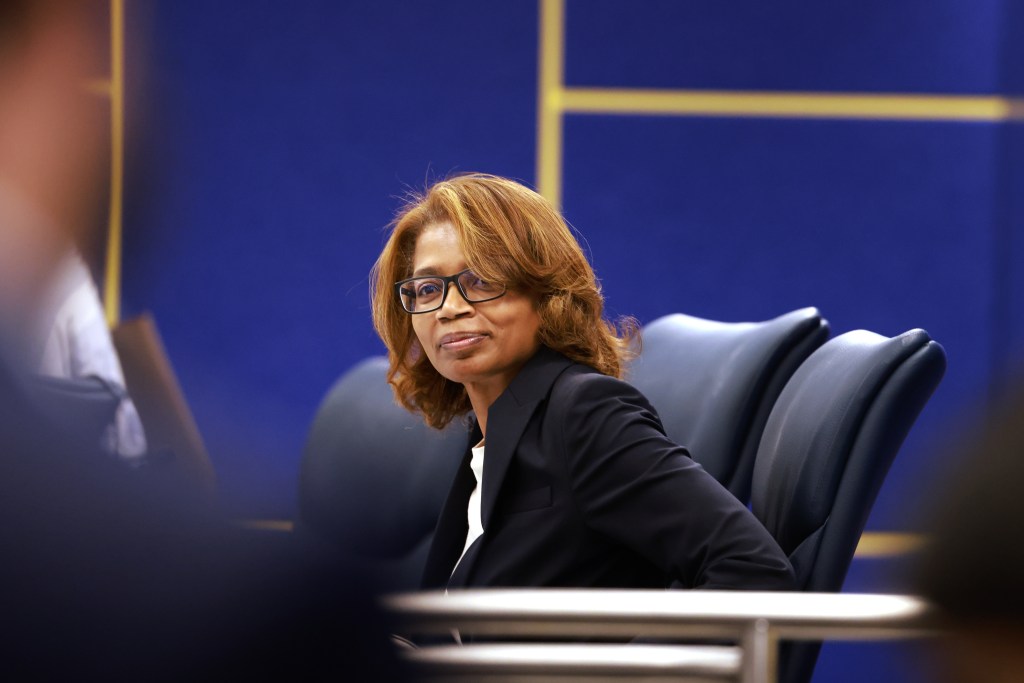Amid protracted debate over whether the state should offer a financial lifeline for Chicago Public Schools, a lawmaker who has floated a proposal for greater state authority over the district expressed hope on Thursday that further discussions could improve city-state relations — even as he took a shot at Mayor Brandon Johnson.
“I believe everybody wants to help children, very few people want to help him based on his lack of leadership,” state Rep. Curtis Tarver, a Democrat from Chicago’s South Side, said of Johnson, who last year made the argument that the city was entitled to $1 billion in additional school funding from the state.
“My only hope is that at some point during this conversation it becomes evident that there’s a shared goal to focus on the children of the district because I have not heard that in the news today,” Tarver said.
Tarver spoke during a legislative hearing on CPS finances during which officials from the city school board and the Chicago Teachers Union again pleaded for more money for a district they say faces a $734 million budget crunch.
School board member Michilla Blaise pushed back against criticism of Johnson, noting he “was an educator, and has some skin in the game” and saying she hoped legislators critical of Johnson’s leadership wouldn’t allow that to get in the way of moving forward.
“This is a great new day, a brand new board, 21 members. We are here to work with you. Hopefully we can heal old wounds. We really want the opportunity to work with you and figure out what’s best for both the state, the whole state, all the students in the state and for CPS,” Blaise said. “I hope that whatever your experiences or your feelings are toward the mayor that you don’t take it out on CPS because we still need you. We need all of you.”
A Johnson spokesperson said the mayor’s focus “remains on the students attending Chicago Public Schools and doing everything to protect the district from the looming federal threats to our education system.”
“We are heartened to see the conversation regarding solutions that empower our CPS students to enjoy the same funding models and stability as other school districts across Illinois,” the spokesperson, Erin Connelly, said in a statement. “Parents and caregivers tell us that cuts aren’t the answer.”
Requests for more state money for CPS are complicated by Illinois’ own tight financial situation. Gov. JB Pritzker and his Democratic allies in the legislature struggled to fill a hole that at one point came to roughly $3.2 billion before passing a $55 billion budget last spring, and the state’s financial outlook by next year remains unclear given uncertain federal funding under President Donald Trump’s administration.
Thursday’s House Executive Committee hearing was in response to a proposal from Tarver that would resurrect a state finance authority overseeing CPS, which could amount to a state takeover of the district. While the proposal has gone nowhere in the legislature, it’s not unprecedented. The state took over the city’s schools in the early 1980s when CPS was in dire financial condition.
 State Rep. Curtis Tarver speaks on Chicago’s South Side on Dec. 17, 2024, during an event at Imani Village. Tarver spoke during a legislative hearing on CPS finances Thursday during which officials from the city school board and the Chicago Teachers Union again pleaded for more money for a district they say faces a $734 million budget crunch. (Brian Cassella/Chicago Tribune)
State Rep. Curtis Tarver speaks on Chicago’s South Side on Dec. 17, 2024, during an event at Imani Village. Tarver spoke during a legislative hearing on CPS finances Thursday during which officials from the city school board and the Chicago Teachers Union again pleaded for more money for a district they say faces a $734 million budget crunch. (Brian Cassella/Chicago Tribune)
Joe Ferguson, president of the Civic Federation, suggested reviving “some aspect” of the finance authority if no other options work.
“While the financial situation of CPS today is not nearly as dire as it was in 1980, many of the same components that drove the district to its breaking point then are evident in the background today,” he said at the legislative hearing. “Reinstating an SFA need not and should not equate to a takeover of the district. It can be calibrated to the circumstance, nor does it need to take anything remotely of the same form it did 40 years ago.”
With or without state oversight, CPS, the school board members and the teachers union, a key ally of Johnson, used Thursday’s hearing to stress the potential impacts on students because of the district’s inadequate finances.
CPS has already announced reductions in the the coming school year in hot meals for students and custodial operations. The district’s budget is required by law to be balanced by Aug. 28 and the school year begins 10 days before that.
At the hearing, Macquline King, the district’s interim CEO, noted that CPS has limited abilities to raise revenue through property taxes. As federal COVID-19 relief money has been running out for CPS and other school districts around the state, Chicago’s district found $500 million in savings in the last year, but King said that many of those savings “were one-time fixes.”
She said cost pressures include the “unique needs of our students,” including those experiencing homelessness, disabilities and those with English as a Second Language needs. Other pressures include the district’s pension obligations and funding for infrastructure improvements for repairs for decades-old facilities.
 Chicago Board of Education member Michilla Blaise speaks during a school board meeting July 24, 2025, at CPS headquarters. Blaise pushed back against criticism of Johnson, noting he “was an educator, and has some skin in the game” and saying she hoped legislators critical of Johnson’s leadership wouldn’t allow that to get in the way of moving forward. (Antonio Perez/Chicago Tribune)
Chicago Board of Education member Michilla Blaise speaks during a school board meeting July 24, 2025, at CPS headquarters. Blaise pushed back against criticism of Johnson, noting he “was an educator, and has some skin in the game” and saying she hoped legislators critical of Johnson’s leadership wouldn’t allow that to get in the way of moving forward. (Antonio Perez/Chicago Tribune)
“Our needs are simply outpacing the available revenue,” King told lawmakers. “Because there is a misalignment between the state, city and district fiscal calendars, we can pass an FY26 budget with a reasonable assumption of future revenue with the realization that we will need to make drastic midyear cuts if the revenue does not materialize.”
The district has indicated there’s enough money to pay for the $1.5 billion four-year contract with the teachers union for the first year, but the new school board will have to confront how to cover the remaining years. Testimony from CTU included a couple of teachers speaking about how they’ve been trying to do their jobs with limited resources.
Deja Tillman, who teaches in the Far South Side’s Roseland community, told lawmakers essential resources for students are often first to go when budgets are slashed.
“We give them a library full of books but no librarian to open the door. So the books sit, unopened, while many of my students read below grade level. We have the tools, but not the staff to use them,” she said. “My students are trying. They want to learn. But they need support. Because while teachers are doing everything we can, we are being asked to do the impossible with crumbs.”
Originally Published: July 31, 2025 at 12:47 PM CDT
